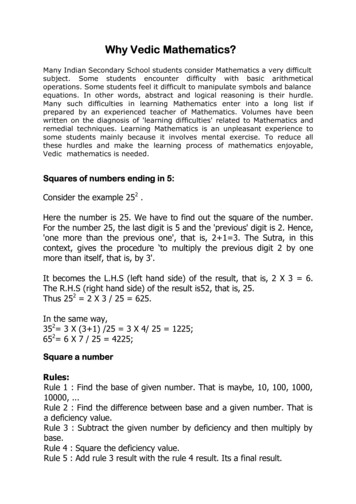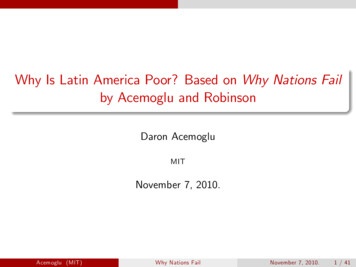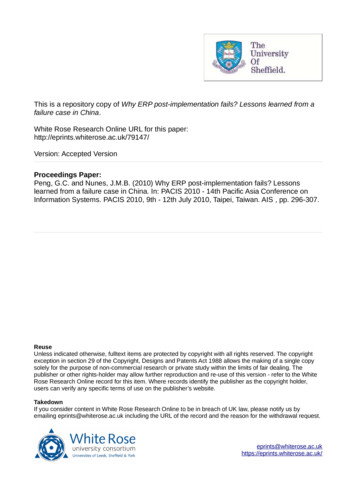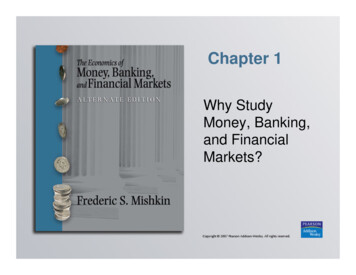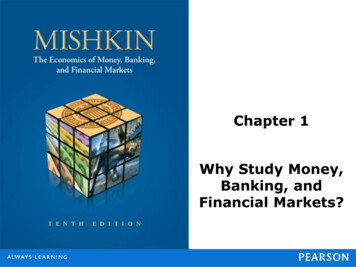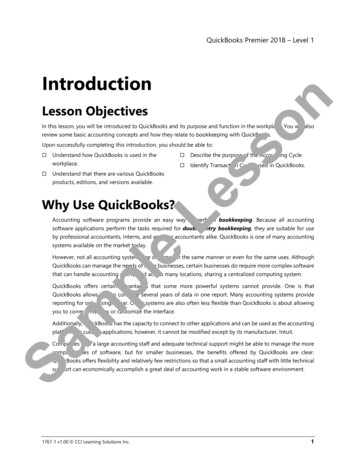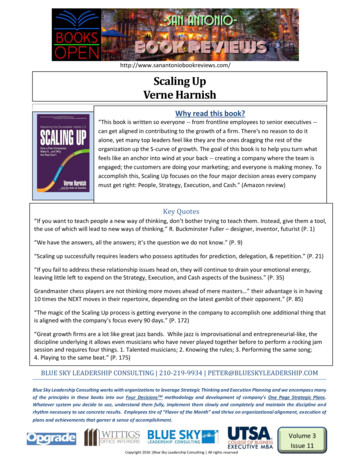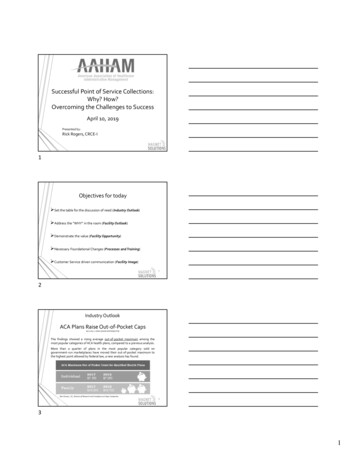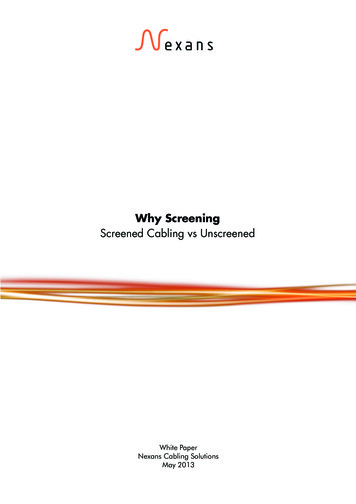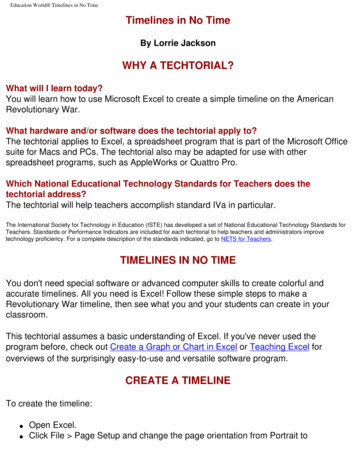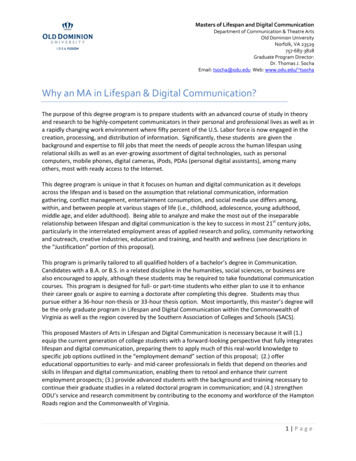
Transcription
Masters of Lifespan and Digital CommunicationDepartment of Communication & Theatre ArtsOld Dominion UniversityNorfolk, VA 23529757-683-3828Graduate Program Director:Dr. Thomas J. SochaEmail: tsocha@odu.edu Web: www.odu.edu/ tsochaWhy an MA in Lifespan & Digital Communication?The purpose of this degree program is to prepare students with an advanced course of study in theoryand research to be highly-competent communicators in their personal and professional lives as well as ina rapidly changing work environment where fifty percent of the U.S. Labor force is now engaged in thecreation, processing, and distribution of information. Significantly, these students are given thebackground and expertise to fill jobs that meet the needs of people across the human lifespan usingrelational skills as well as an ever-growing assortment of digital technologies, such as personalcomputers, mobile phones, digital cameras, iPods, PDAs (personal digital assistants), among manyothers, most with ready access to the Internet.This degree program is unique in that it focuses on human and digital communication as it developsacross the lifespan and is based on the assumption that relational communication, informationgathering, conflict management, entertainment consumption, and social media use differs among,within, and between people at various stages of life (i.e., childhood, adolescence, young adulthood,middle age, and elder adulthood). Being able to analyze and make the most out of the inseparablerelationship between lifespan and digital communication is the key to success in most 21st century jobs,particularly in the interrelated employment areas of applied research and policy, community networkingand outreach, creative industries, education and training, and health and wellness (see descriptions inthe “Justification” portion of this proposal).This program is primarily tailored to all qualified holders of a bachelor’s degree in Communication.Candidates with a B.A. or B.S. in a related discipline in the humanities, social sciences, or business arealso encouraged to apply, although these students may be required to take foundational communicationcourses. This program is designed for full- or part-time students who either plan to use it to enhancetheir career goals or aspire to earning a doctorate after completing this degree. Students may thuspursue either a 36-hour non-thesis or 33-hour thesis option. Most importantly, this master’s degree willbe the only graduate program in Lifespan and Digital Communication within the Commonwealth ofVirginia as well as the region covered by the Southern Association of Colleges and Schools (SACS).This proposed Masters of Arts in Lifespan and Digital Communication is necessary because it will (1.)equip the current generation of college students with a forward-looking perspective that fully integrateslifespan and digital communication, preparing them to apply much of this real-world knowledge tospecific job options outlined in the “employment demand” section of this proposal; (2.) offereducational opportunities to early- and mid-career professionals in fields that depend on theories andskills in lifespan and digital communication, enabling them to retool and enhance their currentemployment prospects; (3.) provide advanced students with the background and training necessary tocontinue their graduate studies in a related doctoral program in communication; and (4.) strengthenODU’s service and research commitment by contributing to the economy and workforce of the HamptonRoads region and the Commonwealth of Virginia.1 Page
Masters of Lifespan and Digital CommunicationDepartment of Communication & Theatre ArtsOld Dominion UniversityNorfolk, VA 23529757-683-3828Graduate Program Director:Dr. Thomas J. SochaEmail: tsocha@odu.edu Web: www.odu.edu/ tsochaProgram HighlightsFirst MA degree in the U.S. on Lifespan and Digital Communication (combined in acomprehensive communication degree)One of four universities in the U.S. to offer a specialization in Lifespan Communication (alongwith Pennsylvania State University, Louisiana State University, and the University of Californiaat Santa Barbara)Active and Award-Winning Communication FacultyTIM ANDERSONROBERT ARNETTE. JAMES BAESLERYI FAN CHENGARY EDGERTONFRAN HASSENCAHLJEFFREY JONESKATHERINEHAMMONDJINSUN LEEKYLE NICHOLASMARGARET PITTSSTEVEN PULLENBURTON SAINTJOHNAVI SANTOTHOMAS SOCHAPOPULAR MUSIC; SOCIAL NETWORKINGSCREENWRITING , FILM HISTORY , FILM CRITICISMRELIGIOUS / SPIRITUAL COMMUNICATION ;NONVIOLENCE & PEACEMOBILE MEDIAMEDIA H ISTORY , THEORY , AND CRITICISM; CONTEMPORARY MEDIA ANDCULTURE ; MEDIA LITERACY ; AND THE DOCUMENTARY TRADITIONINTERCULTURAL COMMUNICATION , GENDER , AND POLITICAL RHETORICPOLITICAL COMMUNICATIONFILM AND THEATREDIGITAL JOURNALISM , CITIZEN JOURNALISM , SOCIAL MEDIA , &RACE/GENDER IN COMMUNICATIONMEDIA STUDIESINTERPERSONAL COMMUNICATION , INTERCULTURAL COMMUNICATION ,IDENTITY , AGING, LIFESPAN COMMUNICATIONSCREENWRITINGPUBLIC RELATIONS , JOURNALISM , PROPAGANDAINTERNATIONAL COMMUNICATION , INTERCULTURAL COMMUNICATIONFAMILY COMMUNICATION , CHILDREN ’S COMMUNICATION ; LIFESPANCOMMUNICATION , POSITIVE COMMUNICATION , GROUP COMMUNICATIONStudents study full-time or part-time; Non-thesis or Thesis; Evenings and Nights at ODU’s NorfolkCampus (future classes may also be offered at the ODU’s Virginia Beach Campus)Classes emphasize both quantitative and critical research methods as well as theoryUnique curriculum where students study human and digital communication development acrossthe lifespan and within life stages (childhood, adolescence, young adulthood, middle age, and elderadulthood).Students encouraged to develop and present research at professional communication conferences2 Page
Masters of Lifespan and Digital CommunicationDepartment of Communication & Theatre ArtsOld Dominion UniversityNorfolk, VA 23529757-683-3828Graduate Program Director:Dr. Thomas J. SochaEmail: tsocha@odu.edu Web: www.odu.edu/ tsochaProgram DescriptionThe Master of Arts in Lifespan and Digital Communication focuses on the study of humancommunication and digital media as they develop across the lifespan and is based on theassumption that relational communication, information gathering, conflict management,entertainment consumption, and social media use differs among, within, and between people atvarious stages of life (childhood, adolescence, young adulthood, middle age, and elder adulthood).Understanding and analyzing the inseparable relationship between lifespan communication anddigital media is a key to success in most 21st century jobs, particularly in the interrelatedemployment areas of applied research and policy, community networking and outreach, creativeindustries, education and training, and health and wellnessAdmissionIn addition to meeting all general University requirements, an applicant must have anundergraduate average of at least 3.25 in Communication or a related field and a 3.00 overall; Twoletters of recommendation from faculty members, or those who can evaluate the applicant’sacademic potential; GRE scores typically at or above 1000 as a composite of the verbal andquantitative scores; and a 500-word essay that outlines the applicant’s professional and personalgoals in pursuing this degree, while explaining the relationship of these aforementioned goals tothe Lifespan and Digital Communication degree program.We will begin accepting applications forODU’s Inaugural MA in Lifespan & Digital Communication class on: [Insert Date]Applications for Fall Admission (only) are accepted throughout the yearPreferred Application Deadline: March 1To Apply—ODU Graduate Admissions: [URL TBA]For information about the MA in Lifespan & Digital Communication:http://www.odu.edu/ tsocha/Masters/ma-index.shtmlDepartment of Communication & Theatre Arts: http://www.odu.edu/al/comm/3 Page
Masters of Lifespan and Digital CommunicationDepartment of Communication & Theatre ArtsOld Dominion UniversityNorfolk, VA 23529757-683-3828Graduate Program Director:Dr. Thomas J. SochaEmail: tsocha@odu.edu Web: www.odu.edu/ tsochaDegree RequirementsThe MA in Lifespan and Digital Communication requires 36 credit hours (non-thesis option) or33 hours (thesis option). No more than 12 hours may be taken on the 500 level. Both non-thesisand thesis option students take five required core courses (15 hours) that include:COMM 601COMM 602COMM 603COMM 604COMM 605Lifespan Communication Theory and ResearchDigital Communication Theory and ResearchSocial Change and Communication SystemsLifespan Communication Research MethodsCritical Methods and Digital Communication33333In addition, students pursuing the non-thesis option take 18 credit hours of COMM electivesand a required 3-credit hour capstone seminar COMM 690. Students pursuing the thesis optiontake an additional 9 credit hours of COMM electives, COMM 696: Thesis Preparation (3 hours)(in the first semester they register for thesis hours) as well as COMM 698 & 699: Thesis (sixhours) in lieu of COMM 690. This thesis is based on original scholarly research and mustaddress a specific and viable topic salient to the student’s core and elective coursework inLifespan and Digital communication.The thesis option is recommended for those students who have maintained a high GPA, havethe support of a faculty advisor from the Communication and Theatre Arts Department, andwho are considering further studies at the doctoral level. The thesis committee, consisting of achair and two other faculty members certified for graduate instruction, direct and evaluate thestudent’s work. Approval of the thesis proposal by the student’s committee and GPD isrequired before the completion of 27 hours of coursework. Upon completion of the thesis, thecommittee will conduct a two-hour examination and defense of the thesis.4 Page
Masters of Lifespan and Digital CommunicationDepartment of Communication & Theatre ArtsOld Dominion UniversityNorfolk, VA 23529757-683-3828Graduate Program Director:Dr. Thomas J. SochaEmail: tsocha@odu.edu Web: www.odu.edu/ tsochaElectivesCOMM 600: Intercultural Communication: History, Theory, and ApplicationCOMM 606: Global Media CultureCOMM 607: Framing TheoryCOMM 610: Screenwriting ProjectsCOMM 614: Communication Ethics in the Digital Age**COMM 615: Construction of the Gendered BodyCOMM 622: Religious/Spiritual Communication and Health**COMM 623: Relational Communication across the LifespanCOMM 624: Positive Communication across the LifespanCOMM 628: Mediated Human Communication in the Information AgeCOMM 630: The Information SocietyCOMM 640: Television and PoliticsCOMM 642: Rhetoric of Propaganda**COMM 650: Religious CommunicationCOMM 672: New Communications Media and Social DevelopmentCOMM 673: Television Histories as Collective MemoryCOMM 675: Television in the Digital EraCOMM 678: Race and TelevisionCOMM 690: Lifespan & Digital Communication CapstoneCOMM 696: Thesis PreparationCOMM 697/698: Tutorial Work in Special Topics in CommunicationCOMM 699: ThesisCOMM 699: ThesisCOMM 795/895: Selected Topics in Communication StudiesCOMM 797/897: Independent Research in Communication Studies[**to be proposed]Anticipated Electives:COMM 6XX: New Media Ecosystems (in the age of networked ubiquity)COMM 6XX: Semantic Webs, Social Graphs and Actor NetworksCOMM 6XX: Nonviolent Communication and Peace5 Page
be the only graduate program in Lifespan and Digital Communication within the Commonwealth of Virginia as well as the region covered by the Southern Association of Colleges and Schools (SACS). This proposed Masters of Arts in Lifespan and Digital
